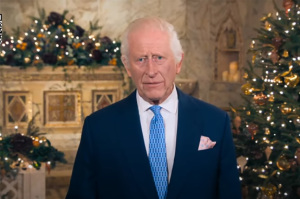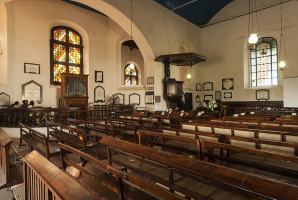Exclusive: World Evangelical Alliance Head Unveils Plans for Iraq
After several long days of back-to-back meetings and zig-zagging from one end of Washington, D.C., to another, the international director of the World Evangelical Alliance had a chance to sit down, unwind and chat with The Christian Post about the WEA's plan to open a branch in Iraq next year.
The following are excerpts from the interview on Tuesday with the Rev. Dr. Geoff Tunnicliffe:
CP: I know that there is a lot of discussion and planning right now for a WEA Iraq branch, but is it a sure thing or only an idea at this point?
Tunnicliffe: Yes, we are committed to seeing an Evangelical Alliance launched in Iraq. We have already been working on it for a year and we think it is a very critical time for the Christians there – with the immense pressure that they are under – to have an Alliance.
They are being forced out of Baghdad because of the violence [moving] primarily to the north, into the Kurdish area. But in the Kurdish area, the church is growing and one of the reasons they are growing is because they are reaching out to the needs of their communities although they are still a very small minority.
They sense it as well that as a small minority they need to come together for joint action, to be able to respond more effectively to needs, to help with the growth of the churches, and to begin to develop a voice.
There is already an existing network [in Iraq] and we've been visiting there for the last year – meeting with them, building bridges of understanding, and bringing them together. As an outside body sometimes we have the capacity to convene people and bring them together even though they may be different parts of the evangelical family. We have a whole strategy and training on what it means to be part of the Evangelical Alliance – which includes going through a membership process where you have to meet guidelines.
We would help them understand how to work as an alliance, build skills of working together across denominational boundaries, and then identifying what they can do together. The question is what can you do better together than alone? So what are the key things that you can come together right now that will enhance the whole work of the Kingdom?
CP: Why has there never been a WEA branch in Iraq before?
Tunnicliffe: Probably because of the size of the church. There are quite a few countries that still don't have an Evangelical Alliance. Part of it is because it's part of the Middle East and the churches there are small.
Certainly the Middle East is a priority for us because we see so much of what happens in the world impacted by what happens in some ways a very small region of the world. So the conflicts that happen in that region impact the rest of the world, so it is important that we engage well in that part of the world.
I am very encourage that there is this movement towards an Alliance in Iraq and I think in the midst of the differences in opinion on the war there should be no questions from evangelical Christians that we should be supporting our brothers and sisters in Iraq no matter where we stand on the war.
CP: Everything in Iraq currently is so closely tied to the country's politics. Would WEA in Iraq become a human rights, religious freedom advocate or what would it do exactly?
Tunnicliffe: Well they (Iraqi evangelicals) would have to determine that. One thing is … I think there is a symbolic sense that by them linking with the World Evangelical Alliance it demonstrates that even though they are a small minority they are not alone but they are part of a large family. There is something very supportive in their mind that says, 'There are a whole lot of people around the world that you are connected to.' So that can be a great encouragement.
And so in some of the countries around the world, where Christians are a very small minority, the fact that they are linked to a global body brings greater encouragement.
If you feel like you're living in isolation and you think you are alone it is very easy to get discouraged and despondent and want to leave. But if you realize that you are part of a growing network of believers it doesn't mean the problems go away, but that you are facing your problems and challenges with a growing group of people that share a common set of values with you.
I think also forming an Evangelical Alliance, which has been demonstrated in other countries, helps in negotiations with governments because the government becomes aware that this group of evangelicals – even though small in their country – is part of a huge network of people around the world. So it is not small or a cult but part of a large Christian family. So when you negotiate different things with the government having that backing is really important.
CP: There is a serious problem with kidnapping of Christians in Iraq. Would the WEA help address this problem? I know the organization has helped raise awareness in a similar situation during the abductions of a pastor and two Christians in war-torn Sri Lanka earlier this year.
Tunnicliffe: We would certainly alert people about these incidents. Part of the role of WEA is to be a megaphone for the evangelicals in a particular country. Whether it is the Palestinians, evangelicals in Israel, Indonesia or in this case Iraq, we would want to tell their stories that are not being told so that the Christian community around the world can pray for them. It is about highlighting stories that almost never get told.
CP: Is there any fear that extremists would attack the WEA center or would it be very covert?
Tunnicliffe: I'm not sure what it would look like. Whether it would be an office in a church or what – I don't know that. I think this is where we take the lead of Iraqi Christians. The last thing we want to do is draw more attention that will bring them harm. So I think listening to their wisdom rather than going in with our agenda is important. We want to listen to their agenda and try to help facilitate that and be responsive to that.
CP: What are some of the types of organizations that you are looking to partner with in building the Alliance in Iraq? What are some of the current unmet needs?
Tunnicliffe: We are in a learning curve with the churches there to identify what are the most important needs. So obviously one of their needs is to help with the finances to fund the development of the Alliance – which isn't a huge amount of money.
Also, right now I think we need help calling the attention of Christians to focus on the Christians in Iraq. When most people think of Iraq, they don't think of Christians there and often times it is not in their frame of reference. Part of what we have to do is get various organizations and ministries promoting prayer and concern for the Iraqi Christians.
Our leaders traveling in Iraq also need wisdom during their interaction and safety.
CP: When do you hope to see an Alliance in Iraq?
Tunnicliffe: I think our goal is to see a functioning Evangelical Alliance in Iraq within 12 months. Given the complexity of traveling into Iraq and the changing dynamics in the country we cannot say that is for sure. We can't even be sure what will happen tomorrow in Iraq so we have to be flexible enough to move with the current reality, but I would like to see us on track to witness this happen within 12 months.
CP: Is there anything else you would like to add?
Tunnicliffe: I think in the midst of all the tragedies and the disturbing stories that are coming out of Iraq, there is also a message of hope that the church is growing in Iraq. It's hard to find a good story coming out of Iraq, but from our community this is one of the good stories.
It is a challenge to the American church in particular because they are so focused as a nation on the war in Iraq. But we hope that they will also start to think about the Christians in Iraq as well. American Christians while they think about having American servicemen in Iraq, we also ask that they pray for Iraqi Christians as well.





























